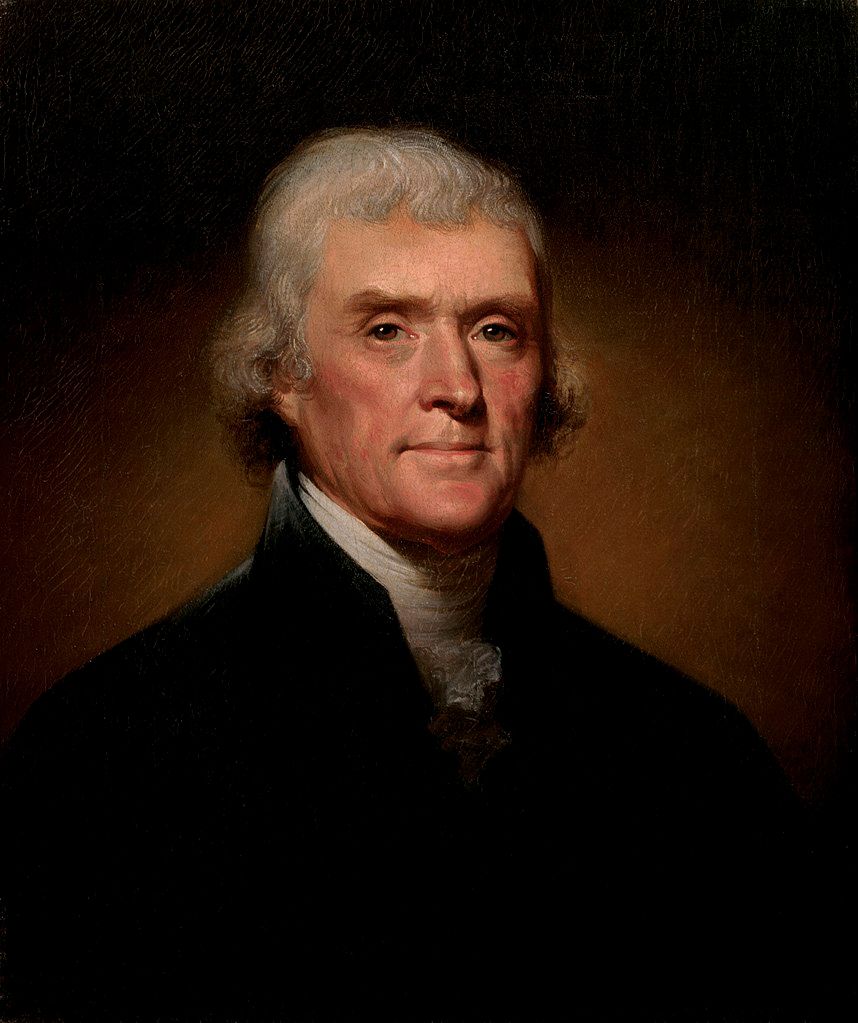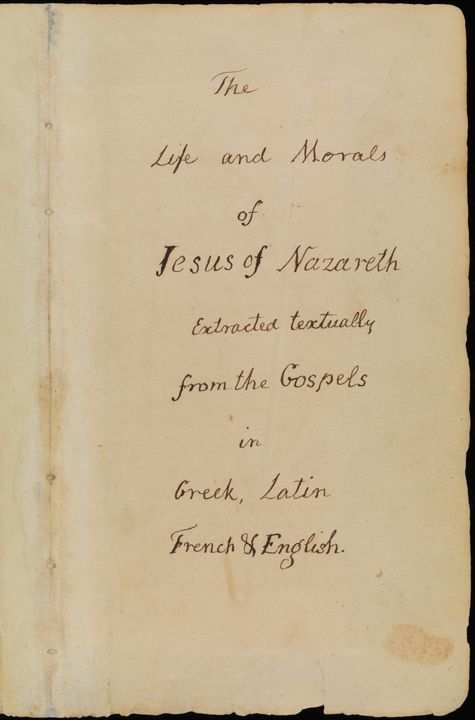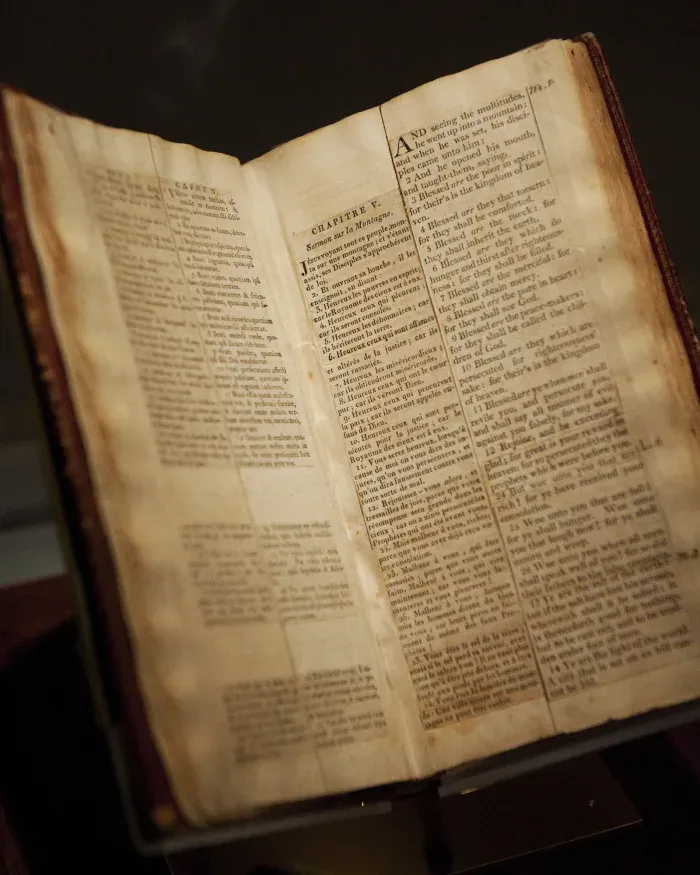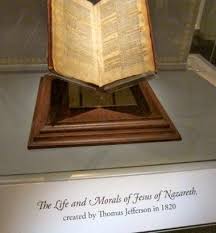
Thomas Jefferson vs The Gospels
“Professing themselves to be wise, they became fools.” Romans 1:22
Thomas Jefferson is considered to be one of the greatest men of the 18th century. He was an American statesman, lawyer, architect, philosopher, Secretary of State under George Washington, second Vice Present of the United States, Governor of Virginia , third President of the United States, legislated both state, national and international laws, surveyor, mathematician, philosopher, vintner, horticulturist and mechanical engineer. So, it was only matter of time before he focused his considerable intellect on the nature of religion in general and Jesus as figured in the Gospels of the New Testament.
Jefferson wrote that he considered himself a Christian in that he was a believer in the moral doctrines of Christ. However, as he grew older, he became more and more distrustful of any supernatural citing in the Gospels. He ultimately came to believe they were nothing more than fictitious hyperbole added to the incredible wisdom of Jesus by well-meaning scribes and early church leaders in order to present Him as super human.
Jefferson was a philosopher with an extraordinary understanding of Greek and Roman philosophical constructs up to and including the philosophers of his day. He had also studied the doctrines of all the major world religions. He reasoned that for him, an understanding and appreciation of God could only come from a rational theology which rejects revelation as a dependable source of divine knowledge. Instead, empirical reason and observation of the natural world were the only logical, reliable and sufficient ways to determine the existence of a supreme being as creator of the universe. This religious belief system was known as Deism. It remained in fashion during the17th and 18th centuries, only to peak in the early 1800’s and then quickly declined. However, some of the doctrines of Deism continue to be a part of other intellectual and spiritual movements such as Unitarianism. While Washington, Franklin and Jefferson all considered themselves Christians, many of their biographers believe their personal Christian belief doctrines appear to lean heavily toward Deism. Jefferson was the only founding father who actually discussed his beliefs with close personal friends and the occasional public remark.
In 1803, Jefferson wrote a letter to Joseph Priestly. He stated that he conceived the idea of writing down his view of the Christian system in 1798-99. His original idea at that time was to start his treatise with the moral writings of the ancient philosophers. Then move on to Deism or the evidence of a supreme creator through the observance of nature. He would conclude with a discussion on the ethics of the Jews followed by the principals of moral philosophy as taught by Jesus. He went on to say he would omit the question of Jesus’s deity.
Jefferson ultimately decided to confine his work to compiling only the morals set forth by Jesus in the Gospels. He felt he had the skill set necessary to discern and tease out the true essence of the philosophy of Jesus from the contaminated, muddled and fictitious accounts contained in the New Testament. His first manuscript was written in 1804 and titled, The Philosophy of Jesus of Nazareth. No copies of this work are known to exist. He later created a second religious manuscript which was a compilation of the four Gospels. This work was titled, The Life and Morals of Jesus of Nazareth and was completed in 1820.To accomplish this task, he would need to deconstruct the Gospels which he well knew were sacrosanct to hundreds of millions of Christians both dead and living. He decided that the best way to proceed was to first strip the words of Jesus from the deeds of Jesus. While he considered the words of Jesus as profound truths, he believed that the miraculous deeds had been artificially added thus creating unnecessary distractions from the true message of Christ. His version of the story of Jesus would focus solely on a philosopher extraordinaire and thus would not include any acts that were supernatural or any verbiage that referred to an unseen spirit world.
Instead, his version would focus only on Jesus as a man of the highest moral principles. A great teacher of profound truths that were so powerful that they did not need to be embellished by the supernatural as this element was at odds with His pure natural approach to the everyday lives of mankind. Jefferson had spent his entire adult life grappling with and doubting much of what organized religion believed and taught both natural and supernatural. Now he was going to set right the false narratives that had been created and used as a devices to increase membership in the Christian movement through the teachings of Jesus as a miracle worker sent from the Creator. Instead, all that was needed was a basic understanding of the moral principles of Jesus and the movement would naturally grow of its own accord.
While Jefferson wrote two volumes on the philosophical ministry of Jesus, he kept these projects private for two reasons. First, he believed a person’s religious beliefs were between themselves and their God. He wrote, “Religion is a matter between everyman and his maker, in which no other, and far less the public a right to intrude.”(Thomas Jefferson to Richard Rush, 31 May 1813) The second reason is a little more ominous. In the 18th century, to physically cut out scripture from a page in a Bible or edit out any of the contents of the Gospels would have been considered blasphemous and caused a public outcry ending a person’s social life and any hope of a political career.
At that time, the United States was deeply rooted in its direct sponsorship of the Christian religion. In fact, the official Christian denomination of the United States was the Episcopal Church of America. And the law stated that no other denominations could receive tax payers monies for support. The Baptist Church challenged this law and Baptist preachers took to the street corners to preach. There, they were promptly arrested and jailed. The churches procured the legal services of none other than Thomas Jefferson to argue their cause. He won the case, and in 1786, created Virginia’s first Bill for religious freedom. In the last years of his life, Thomas Jefferson said he wanted to be remembered for three accomplishments. The primary author of the Declaration of Independence, his role in the creation of the first Bill of Rights insuring the freedom of religion, and the founding of the University of Virginia.
However, very few people actually knew about Jeffersons unorthodox views on the Christian religion. And Jefferson was quick to keep his opinions to himself. He was occasionally asked about his religious beliefs but apparently his answers were seen as skirting the issue. Thus, during the presential campaign of 1800, he was publicly criticized in the press as being a howling atheist and outright blasphemer. It was only after his presidency in the year 1820 and at the age of 74, that he secretly began to actually edit the Gospels to his liking.

Jefferson was proficient at reading in Greek, Latin and French. To aid in his editing process he purchased two copies each, of three additional New Testament translations so as to conduct a comparative study of scripture line by line and word for word. In this way, he reckoned he could best first establish the pure overall doctrine of Jesus. He could then recognize and begin the slow arduous process of extracting in whole or in part those actual words and phrases of Jesus. He wrote that finding the actual words of Jesus in the Gospels was like finding diamonds of wisdom in the dung of ancient political agendas. Only then could he recompose them in the correct order to express a certain teaching in its purest original and undiluted essence.

Next he took a pair of scissors and in some instances a razor blade to delicately cut out only those verses and in some cases certain words that he felt were the actual historical words as spoken by Jesus. The Bible that he edited his clippings from was a 1794 bilingual Latin/Greek version. Additionally, he used a French Geneva Bible and the 1611 King James Version Bible to assist in his comparative studies. His product was not a Bible and Jefferson never referred to it as a Bible. Instead, it was a redacted compilation of the Gospels of Matthew, Mark, Luke and John. For example, in one instance he began a chapter with clippings from Luke chapters two and three then followed with Mark one and Matthew three. The clippings, along with a map of the Holy Land, were glued on blank pages of paper. He sent the pages to a bookbinder in Richmond Virginia who stitched them together in a red leather binding adorned with gold tooling. The work was 84 pages long and completed in 1820 just six years before his death at the age of eighty three.

All things considered, the work is reasonably coherent but at certain places, the material is abruptly truncated. For example, if Jesus performed a miracle mid verse, Jefferson would cut it out of the text mid verse. Jefferson refused to demean a moral teaching with the addition of what he considered fallacious supernatural fables. For Jefferson, Jesus was great among men because of his moral teachings and thus did not need additional aggrandizement by tacking on a miracle. The power of Jesus was in His eternal word and not unproveable mortal healings. While Jefferson and Franklin admitted that God did have the power and the right to intervene into human affairs if and when He so desired, these interventions occurred few and far between.
Jefferson’s work is solely focused on the intellect of Jesus and the great truths He left the world. Therefore, Jefferson excludes all references to the conception of Jesus, His birth, His genealogy, miracles, prophecies, His deity, resurrection and ascension as well as, angels, the Holy Spirit, Heaven and Hell, the Trinity, Satan, Noah and the flood, the Tribulation period, a resurrection of the dead and the idea of eternal life. Jefferson was also not a follower of the Apostle Paul. While working on his Gospel revision, he wrote a letter in 1820 to William Short who served as his professor of natural philosophy while attending the College of William & Mary. In the letter, Jefferson refers to Paul as the, “… first corrupter of the doctrines of Jesus”. Jefferson’s work ends with the crucifixion of Jesus, His body being laid in an unused garden tomb and sealed by a stone. Jefferson created this brief burial narrative by combining the three accounts found in the Gospels (Matthew 27:60; Mark 15:46; John 19:41-42).
Jefferson believed that if the moral teachings of Jesus were followed to the letter, man would become so perfected that he would at last be able to govern himself. This would in turn create a state of complete freedom and thus, no need of civil governance. In short, he believed that the perfection of the human character was the actual object of Jesus’ ministry. And, that this could be accomplished through a deep love of God, love of ones fellow man and innocence of conduct. The results would be the creation of the purest form of liberty achievable by mankind with Jesus of Nazareth as the grand master builder.
The famous religious historian Edwin Gaustad wrote that, “Jefferson composed the book for his own satisfaction in support of the Christian faith as he saw it. In his retirement, Jefferson produced this small book not to shock or offend but he compiled it for himself, for his devotion for his assurance, for a more restful sleep at night and a more confident greeting of the mornings” (Sworn on the Alter of God: A Religious Biography of Thomas Jefferson”, p.131). Jefferson also told John Adams that he read the work each night before he retired and that the project was personal and private.
Jefferson originally thought that by simplifying the Gospels into one cohesive whole, the true doctrine of Jesus would be more widely appreciated by the general public including the uneducated. He was also concerned that Native Americans have access to the basic teachings of Jesus and that this work may well suite that purpose. But Jefferson's use of the word “Indians” seems to have had a duel meaning. He used the word in print twice and once during his second inaugural address when referring to his political opponents in the Federalist Party. Jefferson saw them as having a lack of basic understandings concerning various complex topics and intentionally creating false and slanderous rumors about his supposed unorthodox Christian religious beliefs.
Jefferson wrote of the moral precepts of Jesus, “A more beautiful or precious morsel of ethics I have never seen; It is a document in proof that I am a real Christian, that is to say, a disciple of the doctrines of Jesus.” Jefferson also wrote to John Adams on October 12, 1813,”The ‘Philosophy of Jesus of Nazareth’ was an effort to extract the pure principal of Jesus by stripping away artificial additions by priests. We must only focus on the very words of Jesus. There we find the most sublime and benevolent code of morals that has ever been offered to man. The doctrine that flowed from the lips of Jesus himself are within the comprehension of a child”.
In 1895, The Smithsonian Institution purchased what is commonly referred to as the Original Jefferson Bible but is properly titled, “The Life and Morals of Jesus of Nazareth” (Vol II, 1820). The Smithsonian bought it from his great-granddaughter Carolina Randolph at a price of four hundred dollars. A conservation effort was commissioned in 2009 to completely deconstruct the book and then restore it. All the disbound pages were dry-cleaned and repaired using berlin tissue and a reversible adhesive. The text pages were resewn together through the original sewing holes using unbleached linen thread. The original silk end bands were sewn back into place and the original red Morocco cover and spine were reused. The outcome was a book with the needed flexibility while using materials and techniques sympathetic with the original artifact. Jefferson’s little volume resides at the Smithsonian in an enclosed display case that reduces damage from light, oxygen and moisture yet can still be viewed by the public and scholars. The restored book was the center piece of a public exhibition at the Smithsonian in 2011-2012.

So what can we say for certain about the religious belief system of Thomas Jefferson. We know that he considered himself a Christian. This declaration was based on his appreciation of Jesus intellect as the most profound philosophical teacher of moral conduct in the history of mankind. It is at this point that Jefferson’s understanding of who Jesus was becomes somewhat murky. It is obvious that he does not include nor believe in the miracles of Jesus as described in the Gospels. But the deity of Jesus is supported not only by His tremendous intellect but His ability to create supernatural miracles at will by virtue of the power of the Holy Spirit of God. So the question is, did Jefferson leave out the accounts of miracles because it was irrelevant to his focus only on the moral teachings of Jesus? Or, did he leave out the miracles because they were testaments to His deity and Jefferson did not see Jesus as the Son of God. Was Jefferson insinuating by exclusion that, while Jesus was spectacularly brilliant and the most decent man to ever live, He was not the Creator incarnate. Jefferson appears to have seen Jesus as the Word of God by way of His teachings but not the Son of God. If he had seen Jesus as deity, certainly he could have mentioned it at least once in the book or in his voluminous writings to friends. Instead, he seems to have skirted the issue by stating that he held Jesus in the highest of regards based on His morality teachings and thus was a devoted disciple of Him and His philosophy. But he was apparently not willing to step over the line that separated the physical world from the spiritual world, the natural world of science and the supernatural world of faith.
Jefferson did not state that Jesus was not divine. He stated that he did not have the time to consider this idea. This debate over the natural world verses the spiritual world is very reminisce of first century Judaism. At that time, the Temple priesthood was divided between the Pharisees and the Sadducees. The Pharisees believed in Heaven, angels, a resurrection of the dead and an afterlife. The Sadducees did not believe in any type of existence after death. A man lived, provided for his family and died hopefully leaving his family an inheritance.
However, Jesus spoke publicly that there was a Heaven, angels, an afterlife and a resurrection of the dead. Jesus taught this as part of His ministry but these understandings did not strictly fall within the parameters of his moral teachings on the nature of man. Instead, they were outside of the natural world. But this makes perfect sense in that Jesus stated He came from the spiritual realm of God and into the natural world of man as the Word of God. Then, after His ministry and resurrection, He returned again to His spiritual Kingdom with God the Father (John 16:28, John 17:5). However, this natural vs the supernatural was a threshold that Jefferson, being a modern man of science, refused to cross. He felt that doing so would make his published deductions on nature, law and science less trustworthy to his colleagues who he held in great esteem.
Jefferson was highly educated in all the doctrines of all the world’s major religions. Jefferson had considered all these doctrines and rationally concluded that the wisdom of Jesus was the philosophy that made the most sense for him to follow. Jefferson believed that the teachings of Jesus were the only ones that would lead mankind down the path of perfection. As for miracles and an afterlife, Jefferson seems to have believed that if these things were true, then they would by default, come to those who were disciples of Jesus and adhered as best they could to His moral principles. This would mean that Jefferson could not personally, as a man of reason and science, bring himself to believe what he deduced to be ancillary spiritual ideas. However, on the outside chance that they did exist, he would benefit from them as a devoted disciple of Jesus. But this belief system would put him right on the very edge of the divide between salvation by faith in Christ Jesus' work of the cross and salvation by faith in works, or in Jefferson’s case, faith on a moral philosophy. Jefferson seemed to have believed that since his moral philosophy was based on that of Jesus, at his death and if there was an afterlife, he would receive a get out of jail free pass by Jesus. Therefore, Jefferson never publicly delved into his beliefs in this area because he believed in the wisdom of the old adage, never discuss politics or religion. The reason being, “You cannot reason someone out of something he or she was not reasoned into.” (Jonathan Swift, 1721)
In the end, we are as were Jefferson’s friends throughout his lifetime. He reasoned himself to be a Christian by doctrinal beliefs, but with unspecified reservations. And he refused to reveal these reservations because he knew there would be tremendous public blowback that would damage his reputation and ruin his political career. Perhaps Jefferson said it best when he wrote to his friend Ezra Stiles Ely dated 1819, “You say you are a Calvinist. I am not. I am of a sect by myself, as far as I know.” What we can say for certain is that only God can truly know the heart of a man. And, that no one comes to the Father but through Christ (I Kings:8:39; John 14:6).
On a side note, in a recent PRRI poll, 69% of Americans identify themselves as Christian and believe in a personal God, 22% were unaffiliated with any religious group, 4% were followers of the Jewish, Muslim, Buddhist, Hindu, Unitarian/Universalist religions, 3% were followers of other religions and 2% said they did not know or refused to answer.
If you enjoy the information provided on this site, please consider making a donation of any amount to help continue its production. Donate Now